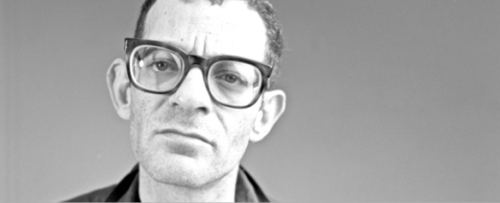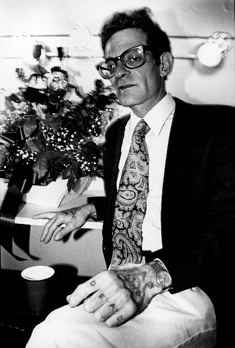
Speaking of himself in the third person, Jesse Bernstein once noted that he was “unemployed until the age of six; since then he has worked as a seeing eye dog for the spiritually impaired and as an emergency storm drain.”
Poet, performance artist, playwright, actor and friend of what he called the expendable people, he killed himself in 1990 in Neah Bay at age 40.
Photo Alice Wheeler
 Most of his friends remember him not for his tragedy, which included mental illness, alcoholism and drug addiction, but for his talent, his generosity, his steadfast loyalty and gleeful charm when the debilitating fog of illness lifted.
Most of his friends remember him not for his tragedy, which included mental illness, alcoholism and drug addiction, but for his talent, his generosity, his steadfast loyalty and gleeful charm when the debilitating fog of illness lifted.
Small with bow legs and tattoos running up his arms, Bernstein had a
gravelly voice that became slurred when he neglected to put in his teeth
for his late-night phone calls to many willing and semi-willing
listeners.
They rarely needed to say anything. On the phone he said it all, ranging
across the history of poetics, the crimes of the Central Intelligence
Agency, the need for cheaper breakfast cereal and the search for a
sustaining form of God’s grace.
A well-edited collection of the range of his best work has yet to appear, although a posthumously released Sub Pop CD titled Prison briefly lit up the charts after selections from it played over the open sequence of Oliver Stone’s Natural Born Killers.
Peter Sillen’s recently completed documentary on Bernstein, I Am Secretly An Important Man, opens at The Full Frame Documentary Film Festival in North Carolina on Friday. It will screen as part of a Creative Capital film festival at the Museum of Modern Art on May 15 & 27. Sillen is still working on a Seattle release.
More Noise Please!
I live on a street
where there are many
many cars
and trucks
and factories
that pump
and bang and
grind all night
and day.
It is a miracle
that I can write poetry
or sleep or
talk on the telephone
or that
my lover will
visit me here.
There is
so much noise.
Every few minutes
a jet comes in low
or a prop job
swings down like
a kamikaze.
There is an airport
at the end of my street.
The new age people say
that you choose
all these things –
choose the cars
and trucks and
airplanes – me and
all of my neighbors.
Maybe this is true;
maybe we can’t live
without
all this goddam noise.
Maybe I need the noise
to write poems
make love and eat.
I’m going to hang a sign
out my window
that says:
More Noise Please!
or:
Thank You For Making Noise!
Maybe we are the kind of people
who need to have
what we don’t want
just to get along,
to do the basic things.
Myself,
I could not sleep
last night,
and I could not
close the window,
either. I tried
to tear the window
out of its frame
and put it
in a closed position,
banging and ripping
with the hammer
and a screw driver,
standing on the window ledge
in my socks
three stories up.
But, the window
wouldn’t come out
and the factory was screaming
and the trucks were rumbling
and the whole world
was praying for silence
and it was up to me
to shut the window
and I couldn’t
get it down.
I was just making
more noise.
A jet went by
and all the people waved.
Thanks, I yelled
as the shifts changed
without a lull in production
at the big plant
across the street.
The workers lined up
at the bus stop
watching me with my hammer
in the window.
I put sponge stoppers
in my ears,
but I can’t stand those things
for more than a few minutes.
Finally,
I put my head
between two pillows.
It is the same
every night.
I love it
I need it.
Without you I could not live,
I would not have written
this poem,
I yell,
the window dangling
half on half off.



Been listening to Prison while out on a road trip around the western states, he is missed, greatly…and loved eternally…